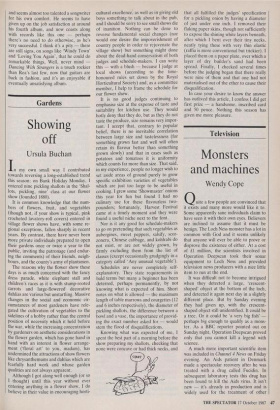Television
Monsters and machines
Wendy Cope
Quite a few people are convinced that it exists and many more would like it to. Some apparently sane individuals claim to have seen it with their own eyes. Believers are inclined to assume that it must be benign. The Loch Ness monster has a lot in common with God and it seems unlikely that anyone will ever be able to prove or disprove the existence of either. At a cost of fl million, the scientists involved in Operation Deepscan took their sonar equipment to Loch Ness and provided television news producers with a nice little item to run at the end.
It was difficult not to become intrigued when they detected a large, 'crescent- shaped' object at the bottom of the loch, and detected it again next day in a slightly different place. But by Sunday evening they had given up, with the crescent- shaped object still unidentified. It could be a tree. Or it could be 'a very big fish' — perhaps big enough to qualify as a mons- ter. As a BBC reporter pointed out on Sunday night, Operation Deepscan proved only that you cannot kill a legend with science.
A much more important scientific item was included in Channel 4 News on Friday evening. An Aids patient in Denmark made a spectacular recovery after he was treated with a drug called Fucidin. In subsequent laboratory tests this drug has been found to kill the Aids virus. It isn't new — it's already in production and is widely used for the treatment of other illnesses. It is now being tried out on groups of Aids sufferers in Britain and Denmark. Neither Nine O'Clock News (BBC 1) nor News at Ten (ITV) mentioned this on Friday and I haven't seen it reported anywhere else.
The science and technology programme Equinox (Channel 4) dealt with an in- teresting subject — artificial intelligence — and managed to make it boring. Apparent- ly lacking confidence in their subject mat- ter or in the human intelligence of people who watch this kind of thing, the programme-makers hired a sub-Gyles Brandreth 'comedian' to jolly the viewers along. It may not have been Stephen Fry's fault that, despite his jovial manner, he had nothing funny to say. He was required to play games against a computer, all of which turned out to be pointless. The first game, for example, was supposed to show that computers are sometimes at a dis- advantage because they can't use intuition. Fry won because he knew things the computer hadn't been told — such as the fact that Go is played by the Japanese. It wasn't intuition, it was general knowledge, and a computer could beat any of us at that, given half a chance.
Later in the programme a computer was instructed to write something about artifi- cial intelligence. The point of this was to demonstrate that, although some machines can construct sentences, they come out with gibberish: The defence sector com- pounds the consequences of, one may suppose, the conceptual standpoint of the 19th century. It is therefore clear that the subject, whilst not enlighten [sic], will clearly expedite international political opinion. The rate of change is unlikely to occur because of this concept.'
`Well, it's just rubbish, isn't it?' com- mented Fry. 'Sounds like a Spectator lead- er.' Not all that much like a Spectator leader, in my view. More like the chairper- son of a late-night discussion on Channel 4.
Welcome to the World (BBC 1) is a series of six programmes about life in the compu- ter age. Instead of a would-be funny person, it has Robert Powell, very actorish and gloomy. In the first programme, last Sunday, he presented a vision of a future in which computers do most of the work and Anna Ford has gone back to her old job as a newsreader. I found it watchable but confusing. Clearly the government minis- ter, played by Sheila Allen, was a fictional character. But what about all the indus- trialists? And what about the quotes? It was difficult to work out which were real and which had been invented. Either way, it was a frightening picture of mass unem- ployment and social unrest. The program- me, entitled 'The Refusal', had no answers to offer — it merely suggested that further advances in computer technology might not be a good thing. Since it is too late to uninvent the computer, we are going to have to come up with better ideas than that.



























































 Previous page
Previous page